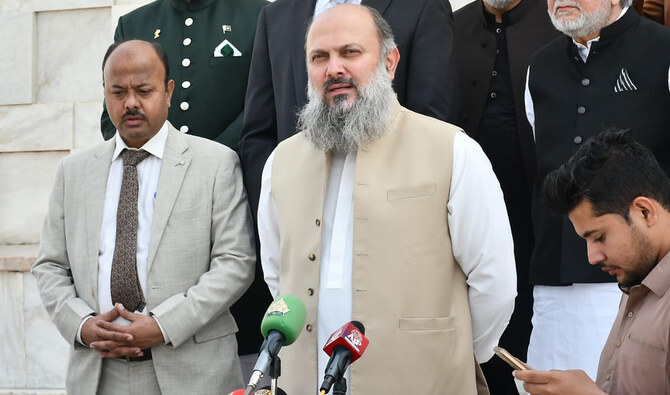ISLAMABAD: Pakistan Foreign Office spokesperson Shafqat Ali Khan said on Thursday a train hijacking by separatist militants in southwestern Balochistan was orchestrated from neighboring Afghanistan, calling on Kabul to crackdown on insurgents operating from its soil.
Militants blew up the rail tracks and opened fire on the Jaffar Express as it made its way to Peshawar in the province of Khyber Pakhtunkhwa from Quetta, the capital of mineral-rich Balochistan, on Tuesday.
Separatist groups are fighting a decades-long insurgency to win secession of the southwestern mineral-rich province, home to major China-led projects such as a port and a gold and copper mine. Balochistan is also home to key other mining projects, including Reko Diq, run by mining giant Barrick Gold, and believed to be one of the world’s largest gold and copper mines. Though Pakistan’s largest province by area, Balochistan is the smallest by population. Balochistan also has a long Arabian Sea coastline, not far from the Gulf’s Strait of Hormuz oil shipping lane.
The decades-old insurgency has continued to keep the province of some 15 million people unstable and created security concerns around Pakistan’s plans to access untapped resources.
A total of 21 hostages and four security troops were killed in the latest standoff, according to the military, but the BLA — the largest of Balochistan’s armed ethnic groups battling the government, which claimed the attack — said 50 hostages were executed.
On Wednesday night, the military said the day-long rescue operation had ended, with 21 hostages and four security troops killed.
“The latest terrorist attack against Jaffar Express near Sibi, Balochistan, was also orchestrated and directed by terrorist ringleaders operating from abroad,” Khan said in a weekly press briefing.
“Terrorists were in direct communications with Afghanistan-based planners throughout the incident.”
The spokesman said Pakistan had repeatedly asked the interim Afghan government to deny the use of its soil to terror groups.
“We urge Afghanistan to hold perpetrators, organizers, financiers of this reprehensible acts of terrorism accountable and cooperate with the government of Pakistan to bring all those who are concerned with this attack, including the real sponsors of terrorism, to justice.”
Khan added that the government remained determined to take care of the problem of terrorism “aggressively.”
“STRATEGIC SHIFT?”
The BLA is the strongest of a number of insurgent groups long operating in Balochistan, bordering Afghanistan and Iran. The insurgents have been fighting to lay a claim to local resources which they say belong to their people.
Balochistan’s mountainous and remote border regions serves as a safe haven and training ground for the Baloch island other militants.
The BLA shocked the country’s security establishment when it stormed army and navy bases in 2022. Last August it conducted a series of coordinate attacks in Balochistan in which over 50, including troops, were killed. It has deployed women suicide bombers in recent years, including in an attack on Chinese nationals at a university in Karachi and a bombing in southwest Balochistan. An umbrella group of several Baloch ethnic groups said last week that it had convened all factions in a bid to unite them under a unified military structure. A dormant BLA splinter group called BLA (AZAD) became active in recent weeks.
Hundreds of Baloch activists, many of them women, have protested in Islamabad and Balochistan over alleged abuses by security forces — accusations the government denies.
Islamabad accuses India and Afghanistan of backing the militants to damage Pakistan’s relations with China, a charge both countries deny.
Speaking to Arab News, security analysts described Tuesday’s hijacking of the train as a “strategic shift” by the BLA in terms of moving away from just military targets to unarmed civilians.
“This may give them instant public and media attention but will weaken their support base within the civilian population which is their ultimate objective,” Syed Muhammad Ali, an Islamabad-based security analyst, told Arab News. “This attack on train passengers will reduce sympathy for BLA and improve public support for military action against terrorists.”
Another security analyst, Dr. Qamar Cheema, Executive Director at the Sanober Institute, said the real challenge was the vast and mountainous terrain of Balochistan, which militant organizations were able to exploit.
He said Pakistan needed to invest in more technology including drones, artificial intelligence and other advanced systems, to monitor and manage remote areas in Balochistan where there was little to no population presence.
Dr. Talat Shabbir, director of the China Pakistan Study Center at the Institute of Strategic Studies, said the BLA’s attack on a passenger train is a reflection of its increasing capacity to carry out acts of “terrorism” and killing people on a larger scale.
“This also speaks of some gaps somewhere due to which terrorists could have that intelligence to carry out such an operation,” he told Arab News.
However, Shabbir acknowledged that Pakistan’s security forces also responded swiftly to effectively manage the situation.
He said the train hijacking would not only impact investor confidence in Balochistan, but also create a “ripple effect” across the country.
“The solution to this problem lies in simultaneously implementing security measures to suppress terrorist attacks and politically engaging with the people of Balochistan,” he added.
Brig. (Retd.) Masud Ahmed Khan, a defense analyst, said the main target of the attacks was the China-Pakistan Economic Corridor (CPEC), a multi-billion-dollar infrastructure project in Balochistan with Chinese investment.
“The real target is CPEC and Chinese investment, with an aim to destabilize Balochistan and target Chinese interests in the province,” Khan said.
With inputs from Reuters


















